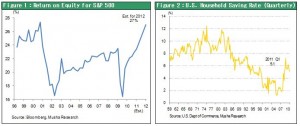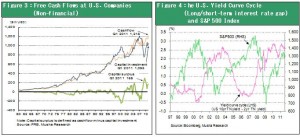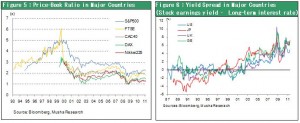Risk-taking is back worldwide. The summer rally has probably started.
(1) Strong earnings ⇒
U.S. companies are reporting healthy earnings despite the current macroeconomic soft patch. In the second quarter, 80% of S&P500 so far reported earnings beat consensus forecasts (Financial Times, July 20, 2011).
(2) Ample funds are available for investments ⇒
Falling interest rates accompanied by rising stock prices are not a sign of economic concerns or risk aversion. Low interest rates are probably nothing more than an indication of the scale of idle funds with nowhere else to go. The high household saving rate and increasing earnings at U.S. companies are two major sources of these funds. Another source is excessive depreciation (the sharp decline of the cost of investment that businesses need to make due to the benefits of globalization and the Internet revolution).
(3) Big long/short -term interest rate gap due to monetary easing ⇒
The large gap between short and long-term interest rates is a major reason for strong earnings at financial institutions. Financial sector stocks have been weak because the Dodd-Frank financial reform law and new government regulations have created concerns about earnings. But the interest rate gap limits the downside to earnings at financial institutions.
(4) Despite these three positive fundamentals,
sentiment in financial markets is pessimistic. The fiscal and debt concerns in Europe, uncertainty about an increase in the U.S. debt ceiling, political instability in Japan and other factors are behind this sentiment. Some hedge funds have raised cash positions to extremely high levels in response to this situation.
But worries about debt in Europe, the United States and Japan are nothing new. Current sentiment is the result of investors’ frustration with the political conflict involving measures to deal with this past debt. Germany opposes support for Greece. The Republican Party opposes an increase in the debt ceiling. Failure to resolve the Greek crisis properly could cause Europe’s sovereign debt problem to spread to Italy and Spain. Moreover, failure to boost the debt ceiling could force the U.S. government to default. Turmoil in financial markets reflects the ongoing process of arriving at a final political settlement. This is why I believe that the European and U.S. problems are both instances where a crisis ends up making the market stronger.
If the events I just described spark resurgence in global risk-taking, Japanese stocks will emerge as one of the most attractive investment in the world. Stocks in Japan have an earnings yield of 7% in relation to a long-term interest of only 1%. The result is a risk premium of unprecedented scale. The existence of gap of this magnitude shows that interest rate arbitrage in Japan is not functioning. But I believe that we are finally approaching the point where this arbitrage will reemerge.







